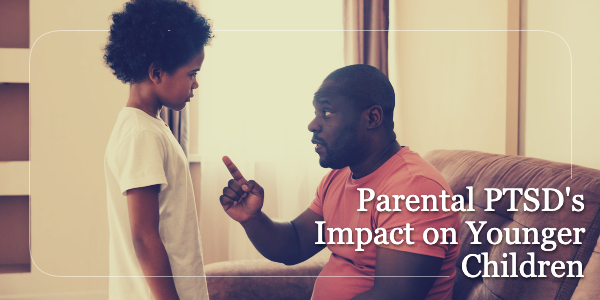6 Strategies for Parenting With PTSD


- Parental PTSD can deeply affect children’s emotional well-being and family dynamics.
- Establishing routines, prioritizing self-care, and open communication help create a stable environment.
- Seeking support, accepting imperfections, and practicing mindfulness are vital for healthy parenting with PTSD.
- Breaking the generational cycle of trauma is possible with professional help and a compassionate approach.

Individuals diagnosed with post-traumatic stress disorder (PTSD) continue to experience the effects of a traumatic event long after its occurrence. They struggle to cease thoughts about the trauma or this mental health condition and become consumed by fear, constantly anticipating its recurrence. An often-used saying for individuals with PTSD is that they are “waiting for the shoe to drop,” always expecting the worst.
For instance, the sound of a helicopter overhead may trigger distressing memories of a battle where close friends lost their lives. Witnessing younger kids being rescued from a burning house can induce flashbacks and disrupt sleep. Moreover, a survivor of sexual assault may exhibit hyper-vigilance in intimate situations with a loving and caring partner.
PTSD can develop in anyone with distressing and traumatic experiences, including severe car accidents, natural disasters, physical abuse, sexual assaults, terrorist acts, wars, or situations where they narrowly escaped death.
The impact on individuals with PTSD can be immense, and it can also have profound effects on their immediate family members, often leaving lasting emotional scars and secondary trauma. When a parent remains untreated for their symptoms, it can create substantial emotional pain and burdens for their children.
This article examines in detail how a parent’s or close family member’s PTSD affects the entire family, particularly the children.
The Impact of Parental Post-traumatic stress disorder on younger children
A parent’s PTSD can have a profound and long-lasting impact on their child. Childhood is a period characterized by curiosity, learning, and sometimes confusion. Children naturally turn to their parents for guidance and protection. When young child feels scared, they seek refuge in a parent’s arms, hoping to be comforted and shielded from danger.
However, suppose the parent’s response to a fear-inducing event hampers their ability to address the child’s anxiety. In that case, the child feels confused, unloved, and uncertain about what to expect from their parent. PTSD can render a parent incapable of meeting their child’s needs or cause them to react in alarming ways, including verbal or physical aggression.
A household where an individual, particularly a parent, has PTSD can be an environment fraught with uncertainty. Children growing up in such families may face challenges from exposure to angry outbursts, fears, and the parent’s inability to establish a nurturing parent-child relationship.
These children never know when a triggering traumatic event might awaken traumatic memories, causing them to live in a constant state of anticipation of impending disaster.
Young children, unable to comprehend the reasons behind a parent’s erratic behavior, may feel rejected and insecure. The presence of PTSD can be frightening when a parent becomes violent during an episode.
Parents with PTSD may be unable to partake in activities that most families enjoy, such as visiting amusement parks, watching fireworks displays, or going to the movies, as these experiences may trigger a PTSD episode due to loud noises or sudden bursts. Consequently, a child may associate their parent’s unwillingness to engage in fun activities with a lack of love.
Children with parents suffering from PTSD may encounter difficulties in their relationships. They might exhibit disruptive behavior in school, being either aggressive or withdrawn. These children may turn to peers involved in substance abuse or risky behaviors for solace. They may struggle to concentrate on schoolwork and experience sleep deprivation when a parent with PTSD behaves unpredictably during the family’s sleep hours.
Parenting strategies for people who are dealing with PTSD
Parenting with PTSD can be challenging. All parents experience moments of regrettable mistakes, but it’s crucial to be mindful of when your actions might cross the line into being abusive or overly controlling. If you’re concerned about how your complex PTSD affects your parenting, consider the following tips:
1. Avoid giving a reaction in every situation
Take a moment to evaluate if your reaction is proportionate to the situation. For instance, if your child makes some mistake, and you find yourself criticizing and screaming at them, the traumatized and stressed part of you has likely taken over. This response is typical, especially if you were never allowed to make mistakes as a child.
As an adult, you can be triggered by past fears, leading to an exaggerated reaction in the present. When you feel overwhelmed, stepping back from the situation is essential. Give yourself the space to calm your traumatized brain, reflect on what happened, and respond appropriately.
2. Establish Routine and Prioritize Self-Care
Parenting while living with PTSD can be challenging, but you can manage symptoms and maintain a healthy environment for both the parent and child. One big tip is to establish a consistent routine.
Research suggests that routine can help reduce stress and anxiety, particularly for individuals with PTSD. A consistent pattern can include regular meal times, consistent sleep schedules, and structured daily activities.
3. Consider enrolling in parenting classes
As a survivor, you may not receive proper parenting, leaving you without a positive example when raising your children. Parenting classes can provide valuable insights into meeting your child’s developmental needs and navigating difficult parenting situations. Such courses give you the knowledge and skills to become a more effective and well-equipped parent.
Focus on self-care
It’s important to prioritize self-care, including exercise, therapy, and other stress-reducing activities. Additionally, it’s essential to communicate with your child in an age-appropriate manner about your condition and let them know that they are not guilty.
“By establishing a consistent routine and prioritizing self-care, parents with PTSD can better manage their symptoms and provide a stable environment for their child,” said Tali Ditye, Ph.D., Editor-in-Chief and Co-founder, Mommyhood101
4. Communicate Openly with Your Child
My primary tip for parenting while living with PTSD is to practice open communication with your child, according to their age and understanding. Help them learn about mental health in an age-appropriate way and explain that you’re dealing with a condition called PTSD (or stress for simplicity) which can sometimes cause you to feel or behave differently. Encourage your child to express their feelings, so they feel comfortable discussing any concerns or emotions they may have.
“Remember that you don’t need to share every detail of your PTSD experience with your child. However, a basic understanding of the situation can help them feel more secure and develop empathy. Additionally, maintaining open communication can strengthen your bond and help your child feel more connected to you, even during challenging times.” said Charlie Penwarden, Mental Health Consultant, Behaveo.
5. Accept Flaws and Seek Assistance
While parenting while suffering from PTSD can be challenging, the fact that you’re reading up on the subject and doing your research indicates that you care deeply and want to be a good parent.
Remember, they’ll have unhappy times occasionally, but that’s good because it’s a necessary part of growing up and their natural development. They can’t always be happy. It’s acceptable not to be the ideal parent, but what counts most is that you are trying to raise your children in a secure, adoring, and supportive atmosphere. Never be reluctant to seek assistance if you ever require it.
6. Exercise reflection and mindfulness
One advice for parenting while dealing with PTSD is to engage in regular, everyday reflection. In this context, contemplation refers to sitting in a calm environment, closing your eyes, and looking back on your actions to determine the key factors that led to your posttraumatic stress disorder moments.
Given the circumstances, you will become more prompt to consider your appropriate response. Knowing your triggers and knowing when the traumatized, stressed-out side of you has taken control is crucial.
For instance, if your child makes a minor error and you yell angrily at them from the rooftops, your PTSD may prevent you from being a good parent.
How to break the Generational Cycle of PTSD with the help of mental health professional
Parents who experience PTSD may encounter challenges in adhering to recommended strategies to address their trauma. Some parents sincerely seek professional assistance and work through their traumatic experiences.
However, if a parent cannot fully engage in the treatment, it should not hinder their adult child’s determination to overcome the challenges associated with secondary PTSD.
In cases where a parent continues to grapple with PTSD, there remains hope for positive change. The adult child can play a crucial role by encouraging the parent to participate in family therapy, which serves as a platform to address unresolved issues, foster effective communication, and potentially achieve significant breakthroughs. This collaborative approach makes it possible to interrupt the cycle of PTSD and prevent its adverse impact on future generations.
Conclusion
Parenthood is inherently challenging, but the difficulties can feel insurmountable when simultaneously managing complex posttraumatic stress disorder (PTSD) while raising children. Many individuals who have survived trauma impose heightened expectations on themselves as parents, striving to break the cycle of abuse from previous generations.
However, this can lead to an extreme mindset where parenting feels unattainable. Parenting stress can sometimes trigger overreactions and undue harshness towards your children. As trauma survivors, it is crucial to maintain mindfulness to prevent transmitting your traumas to your children.
